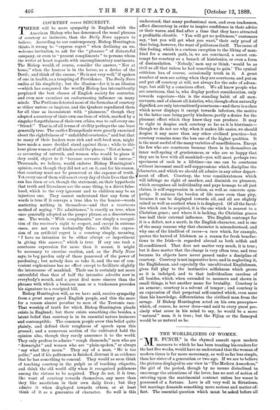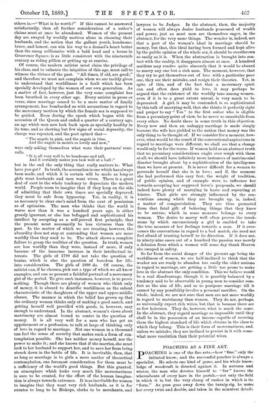THE WORLDLINESS OF WOMEN.
MR. PUNCH," in the rhymed assault upon modern _LILL manners to which he has been treating his readers for the last five weeks, would have us understand that the woman of modern times is far more mercenary, as well as far less simple, than her sister of a generation or two ago. If we are to believe the pictures displayed to our view in" The Modern Asmodeus," the girl of the period, though by no means disinclined to encourage the attentions of the lover, has no sort of notion of entering upon the matrimonial contract unless her wooer is possessed of a fortune. Love is all very well in flirtations, but marriage demands something more serious and matter-of- feet. The essential question which must be asked before all
others is,—" What is he worth ?" If this cannot be answered satisfactorily, then all further consideration of a suitor's claims must at once be abandoned. Women of the present day are swayed by worldly motives alone in choosing their husbands, and the notion that the gallant youth, handsome, brave, and honest, can win his way to a damsel's heart better than the smug millionaire with a bald head and a house in Grosvenor Square, is as little consistent with the nineteenth century as riding pillion or getting up at sunrise.
Of course, the modern satirist must claim the privilege of his class, and to enhance the iniquities of this age, must call to witness the virtues of the past. "All times, if old, are good ;" and therefore we must not complain when we are tacitly given to understand that worldliness is a fault which has been specially developed by the women of our own generation. As a matter of fact, however, just the very same complaint has been breathed in every other age. Every satirist in prose or verse, since marriage ceased to be a mere matter of family arrangement, has bombarded us with accusations in regard to the mercenary motives by which the female sex is supposed to be guided. Even during the epoch which began with the accession of the Queen and ended a quarter of a century ago, an age which men now look back upon as specially healthy in its tone, and as showing but few signs of social depravity, the charge was repeated, and the poet opined that- " The angels in pink, and the angels in blue, And the angels in moires so lovely and new," were only asking themselves what were their partners' rent. rolls.
"It is all very well to be handsome and tall, And it certainly makes you look well at a ball :" but in the end the only thing that really matters is : What have you got P In truth, the accusation is one which has always been made, and which it is certain will be made as long as girls want husbands and men want wives. There is a great deal of cant in the whole tendency to depreciate the modern world. People seem to imagine that if they keep on the side of admitting that their own times are specially depraved, they must be safe from hypocrisy. Yet, in reality, it is as necessary to clear one's mind from the cant of pessimism as of optimism. The man who thinks that the world is worse now than it was a hundred years ago, is either grossly ignorant, or else has befogged and sophisticated his intellect by accepting as a self-proved first principle, that the present must necessarily be less virtuous than the past. In the matter of which we are treating, however, the absurdity does not stop at contending that women are more worldly than they used to be. The attack shows a complete failure to grasp the realities of the question. In truth, women are less worldly than they were, instead of more, if only because of the immense increase in their intellectual in- terests. The girls of 1789 did not take the question of brains, which is also the question of boredom for life, into consideration. The girls of 1889 do. Of course, the satirist can, if he chooses, pick out a type of which we all know examples, and can so present a faithful portrait of a mercenary girl of the period. To give such instances, however, is to prove nothing. Though there are plenty of women who think only of money, it is absurd to describe worldliness as the salient characteristic of the daughters of the upper and upper-middle classes. The manner in which the belief has grown up that the ordinary woman thinks only of making a good match, and getting herself well provided with goods, is, however, easy enough to understand. In the abstract, women's views about matrimony are almost bound to centre in the question of money. It is all very well for a man who has got an appointment or a profession, to talk at large of thinking only of love in regard to marriage. Not one woman in a thousand
can feel the sense of security that makes such a form of con- templation possible. She has neither money herself, nor the power to make it; and she knows that if she marries, she must look to her husband to support her, and to save her from being struck down in the battle of life. It is inevitable, then, that
as long as marriage is to girls a mere matter of theoretical contemplation, one foremost consideration for them must be a sufficiency of the world's good things. But this granted, an atmosphere which looks very much like mercenariness is sure to be created, for the effort of the human imagina-
tion is always towards extremes. It is as inevitable for women to imagine that they want very rich husbands, as it is for curates to long to be Bishops, clerks to be merchants, and
lawyers to be Judges. In the abstract, then, the majority of women will always desire husbands possessed of wealth and power, just as most men are themselves eager, in the abstract, for the very same things. The wonder is, indeed, not that a part of the woman's ideal in marriage should be money, but that, this ideal having been formed and kept alive by the public opinion of the whole sex, it should be overthrown so easily as it is. When the abstraction is brought into con- tact with the reality, it disappears almost at once. A hundred maidens may resolve quite sincerely that it would be absurd to marry any one but a rich man. The moment, however, that they try to get themselves out of love with a particular poor one, they see their mistake, and resign their theories. Yet, in spite of this, and of the fact that a mercenary spirit can and often does yield to love, it may perhaps be argued that the existence of the worldly tone among women, even if it is to a great extent unreal, is very much to be deprecated. A girl, it may be contended, is so sophisticated by this talk of marrying well, that she thinks it perfectly right and proper to say " Yes " to the first suitor who is eligible from a pecuniary point of view, be he never so unsuitable from every other. No doubt there is some truth in this objection. Every now and then an unhappy marriage is made simply because the wife has yielded to the notion that money was the only thing to be thought of. If we consider for a moment, how- ever, what would be the result if the conventional aspirations in regard to marriage were different, we shall see that a change would only be for the worse. If women held as an abstract truth that no pecuniary considerations ought ever weigh with them at all, we should have infinitely more instances of matrimonial disaster brought about by a sophistication of the intelligence than we have at present. It is never difficult for a woman to persuade herself that she is in love ; and if, the moment she had performed this easy feat, the weight of tradition, of public opinion, and of example were to influence her towards accepting her supposed lover's proposals, we should indeed have plenty of marrying in haste and repenting at leisure. That girls are strongly influenced by the con- ventions among which they are brought up, is, indeed, a matter of congratulation. They are thus protected from that fatal gift of believing things that they know to be untrue, which in some measure belongs to every woman. The desire to marry well often proves the touch- stone by which unconsciously a girl is enabled to take the true measure of her feelings towards a man. If it over- comes the conventions in regard to a bad match, she need not feel afraid of trusting herself to its direction. If it does not, in ninety-nine cases out of a hundred the passion was merely a delusion from which a woman will some day thank Heaven she escaped in safety.
So far from the social danger of the present age being the worldliness of women, we are half-inclined to think that the weaker sex are ready to abandon too easily the older notions in regard to marriage, are getting a little too prone to make love in the abstract the only condition. This we believe would be a real disadvantage, though it is possibly balanced by a tendency said to be observable in young men to consider com- fort as the aim of life, and so to postpone marriage till it cannot by any possibility involve a personal sacrifice. On the whole, indeed, we are not sure that men are not more worldly in regard to matrimony than women. They do not, perhaps, so universally expect rich wives, but that is because there are so few heiresses. They do, however, what is much the same. In the abstract, they regard marriage as impossible until they shall be in the possession of an income capable of securing them the highest standard of life which obtains in the class to which they belong. This is their form of mercenariness, and, unless we mistake, they are inclined to persist in it with some- what more resolution than their potential wives.



















































 Previous page
Previous page